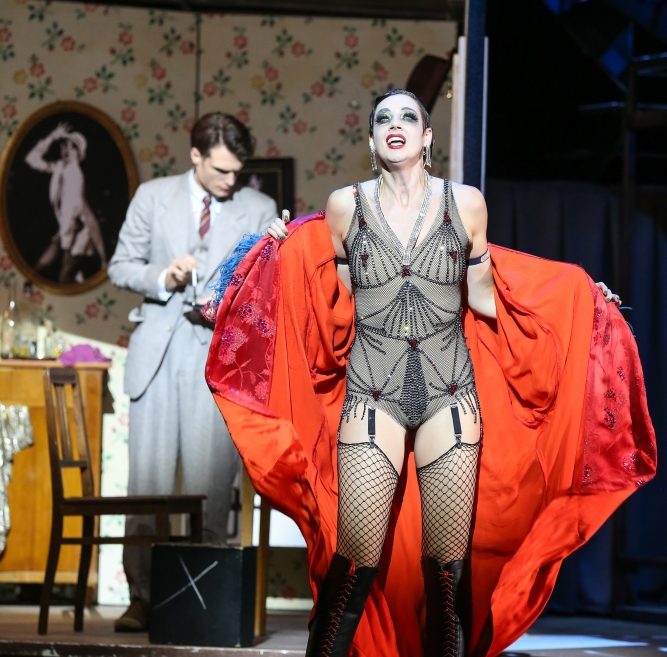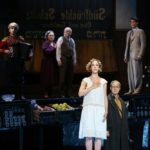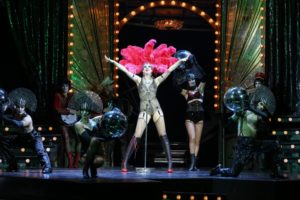 Wilkommen, Bienvenue, Welcome! Vienna Volksoper’s opening set’s ‘agit-prop’ scaffold has a printed curtain with slogans. The artists in wildly colourful outfits, including circus jugglers, represent the free-and-easy, cosmopolitan world of 1929 Berlin. Cabaret, in 1920’s Berlin, was subversive.
Wilkommen, Bienvenue, Welcome! Vienna Volksoper’s opening set’s ‘agit-prop’ scaffold has a printed curtain with slogans. The artists in wildly colourful outfits, including circus jugglers, represent the free-and-easy, cosmopolitan world of 1929 Berlin. Cabaret, in 1920’s Berlin, was subversive.
And the Master of Ceremonies is Ruth Brauer-Kvam, transgender, bald, white makeup, the ‘linkman’, like a clown, commenting on the action, sometimes resembling a grim reaper. Wilkommen! The girls are beautiful, the orchestra is beautiful. Super orchestra, Volksoper’s, conducted by Lorenz C. Aichner, really swings!
Then we’re on a train, Clifford Bradshaw (Jörn-Felix Alt) meets the talkative, over-friendly Ernst Ludwig (Peter Lesiak), who invites Cliff to the Kit-Kat club, and knows the best pension in Berlin. (Kit-Kat’s MC is the ticket collector welcoming the American to Germany.) Clifford is fresh-faced, a little shy. Alt is surprisingly convincing as the writer, Schriftsteller, based on Christopher Isherwood’s from Berlin Stories, come to Berlin for inspiration, in a turbulent affair with singer Sally Bowles. Yet Volksoper’s translation of Fred Ebb and John Kander’s 1966 musical is in German, with only the three extra numbers from the (1972) film sung in English. (So why are there no English surtitles?)
At Fräulein Schneider’s, the stage (Heiko Meixner) resembles a carousel on three levels: ground, Clifford’s bedroom, the lounge, first floor, Schultz’s room, top, ‘BERLIN’ sign. Dagmar Hellberg’s mature mezzo as Schneider-matronly and matriarchal, hardened, but with heart- is a real character. She’s befriended the Jewish Schultz, and herself a Nazi target.
 At the Kit Kat club, Bowles (Bettina Mönch) is on stage in a sailor’s outfit; the others strip off, the dance troupe, now down to black negligees, suspenders, and high boots. (Stunning dance routines, choreography by Melissa King.) Then we notice that they’ve got beards. So they’re in drag? Clifford is teaching the shady businessman Ernst English. Ernst notices that one of the dancers, Bobby, recognises Clifford from London. (Clifford looks uncomfortable.)
At the Kit Kat club, Bowles (Bettina Mönch) is on stage in a sailor’s outfit; the others strip off, the dance troupe, now down to black negligees, suspenders, and high boots. (Stunning dance routines, choreography by Melissa King.) Then we notice that they’ve got beards. So they’re in drag? Clifford is teaching the shady businessman Ernst English. Ernst notices that one of the dancers, Bobby, recognises Clifford from London. (Clifford looks uncomfortable.)
Mönch visits Clifford’s room, still wearing her ‘stage’ outfit, under a scarlet silk dressing gown. With cropped black hair, she, Mönch, is so incredibly tall, stiletto-heel boots notwithstanding.
At the New Year’s party, Mönch sings the show-stopper Mein Herr, but it’s in English- one of the film’s showstoppers. ‘You have to understand who I am …what I do, when I’m through.’ In her bowler hat and black corset she invites comparisons with Lisa Minnelli. Mönch belts it out. Vocally, and as a dancer, she cuts it; what she lacks is Minnelli’s skills as an actress. We shouldn’t compare musical to film, but Minnelli’s Bowles has as vivacity, a human vulnerability: irresistible charm. Mönch is merely a star musical performer.
Alt’s Clifford, too broke to tip, sings ,Unglaubliche Stadt (unbelievable city.) The surprise is that he can sing. Alt, a soft, lyrical tenor, is an accomplished ‘musical’ artist all over Germany. Dramatically, Alt’s performance, mainly spoken, has real depth.
Another icon, Two Ladies– MC cavorting with two horses’ heads- introduces the political subtext. A Nazi soldier holds up a map of Europe. This Volksoper production (Gil Mehmert) plays up the political, the rise of National Socialism. (But the film does this more subtly.)
In the traditional German drinking song, ‘Tomorrow belongs to me’, we see huge piano keys front of stage, with four singers, the boyish blonde singing Der morgige Tag ist mein . It’s powerfully rendered, but over-dramatic.
Joel Gray’s Oscar-winning triumph, ‘Money makes the world go round’- wittily choreographed, brilliantly comic- is not so good here. Sorry, but Volksoper’s caricature capitalist businessman – the mask with a huge cigar- is grotesque. Satirical, but it’s offensive, and could just be a Jewish stereotype (obviously not intended.)
However, in this version’s sub-plot, landlady Schneider and her Jewish tenant Schultz, decide to get married. In the ‘engagement’ party, held at Schultz’s shop (the Hebrew lettering seen in reverse), Sally has brought her Kit Kat friends over. Robert Meyer’s Schultz sings the Jewish song Mieskeit, “a parable about ugliness and unexpected happiness.” (Hellberg’s Schneider and Meyers’ Schultz are beautifully enacted, fine for the packed Viennese audience.)
Then we notice Ernst’s overcoat covering his Nazi uniform. Ernst insidiously walks onto the stage, while Schultz is doing a yiddish dance. Now Lesiak, in Nazi regalia, condemns and insults the ‘disgusting Jew’, and upbraids Schneider’s intentions of marrying him. He sermonises, rants about ‘racial purity’. (Fraulein Schneider, we’ve been watching you.) He is no German. To which Schultz defiantly retorts, ‘I WAS BORN HERE, I fought for the fatherland.’
The party breaks up, and Fraulein Köst (Joanna Arrouas) – Schneider’s tenant reprimanded as a prostitute- sides with Ernst. She sings the Vaterland song, Tomorrow is mine. Hitler youth line the front of stage; a swastika flag unfolds, and the chorus now carry torches of fire. It’s a shocking ending to the first half, but is this Nazi subtext blown out of proportion for a musical?
Act 2, however, opens with a stunningly choreographed cancan sequence- red plumes, hooped ever-so-small mini skirts, the odd transvestite with a beard. But now there are small swastikas decorating the set. (MC Brauer-Kvam, now in a white gown, as Volksoper orchestra play the Cabaret anthem.)
Schulz comments, it was quite an evening; an understatement. Frau Schneider wants to break the engagement. He counters, governments come and go. Then they notice anti-semitic graffiti daubed on the shop front. Now on stage, the monkey in the white evening gown: ‘If you could see her with my eyes.’ The MC pleads for a little understanding, and mutters, she looks yiddish.
 The show-stopping number, Maybe this time, (I’ll be lucky), precedes the breakup of her relationship with Cliff. Sung by Mönch in a scarlet-red gown, it’s a stupendous, stomping number, belted-out by Mönch. We then see her sniffing coke, knocking back a flask of gin. (She’s pregnant, Cliff doesn’t want him born in Nazi Germany. She’s high, impossibly high. (Maybe that’s why he’s going.) But where’s the charming Sally Bowles? She cannot face the political realities: ‘Nothing to do with us’, echoed by Schulz, who’s at first in denial. But Schneider calls the marriage off. Her Wie geht es weiter (What happens next), like an aria, is superb, embittered, passionate, Hellberg a ‘veteran’ performer.
The show-stopping number, Maybe this time, (I’ll be lucky), precedes the breakup of her relationship with Cliff. Sung by Mönch in a scarlet-red gown, it’s a stupendous, stomping number, belted-out by Mönch. We then see her sniffing coke, knocking back a flask of gin. (She’s pregnant, Cliff doesn’t want him born in Nazi Germany. She’s high, impossibly high. (Maybe that’s why he’s going.) But where’s the charming Sally Bowles? She cannot face the political realities: ‘Nothing to do with us’, echoed by Schulz, who’s at first in denial. But Schneider calls the marriage off. Her Wie geht es weiter (What happens next), like an aria, is superb, embittered, passionate, Hellberg a ‘veteran’ performer.
For Cliff, Berlin ist vorbei, Es war lustig…It was fun, but it’s over. At the Kit Kat the art-deco black and gold stage has Nazi officers either side of MC Brauer-Kvam. We see Ernst offer Cliff 200 marks, which he refuses. Later he’s beaten up in the pension by Nazi officers. Bowles returns to the Kit Kat to sing the bitter-sweet Cabaret anthem, Mönch’s rendering vigorous, high-voltage in this wonderful number about her friend in Chelsea, stuck in her room. (Come to the cabaret, old chum.) Unfortunately, this one’s in German.
She’s a loser, Bowles sings. She’s terribly sorry. (Implicitly, she’s had an abortion.) Problem is Mönch’s Bowles is so extreme- she seems to go everywhere half-dressed in scanty stage wear- she’s not really plausible.
However, we see Clifford, waiting for a train; he’s writing in his diary, the MC standing behind him. Now it’s Cliff wearing the MC’s huge white gloves- singing the Cabaret anthem in English. Alt’s Cliff is an enigmatic, haunting character. Because he’s a writer, he sings very little, but well. Brauer-Kvam’s Mc, outstanding throughout, brings resolution. Aichner, after many curtain-calls, treated us to a medley of Cabaret’s hits. Ebb and Kanders’ songs are classics, but the musical of the 1960’s is, with its contemporary, political resonances, no less relevant. Interesting in German, but with Bowles and Clifford ‘English’ speakers in Berlin, it’s surprising there are no English surtitles. © PR 27.10.19
Photos: Jörn-Felix Alt (Clifford Bradshaw), Bettina Mönch (Sally Bowles); Bettina Mönch (Sally Bowles), Jörn-Felix Alt (Clifford); Johanna Arrouas (Fräulein Kost), Peter Lesiak (Ernst), Dagmar Hellberg (Fräulein Schneider), Robert Meyer (Schultz); Bettina Mönch (Bowles); Featured image Ruth Brauer-Kvam (MC) and Kit Kat ensemble
© Barbara Pálffy /Volksoper Wien

whoah this blog is wonderful i really like studying your articles. Stay up the good work! You recognize, a lot of persons are searching round for this info, you can aid them greatly. |